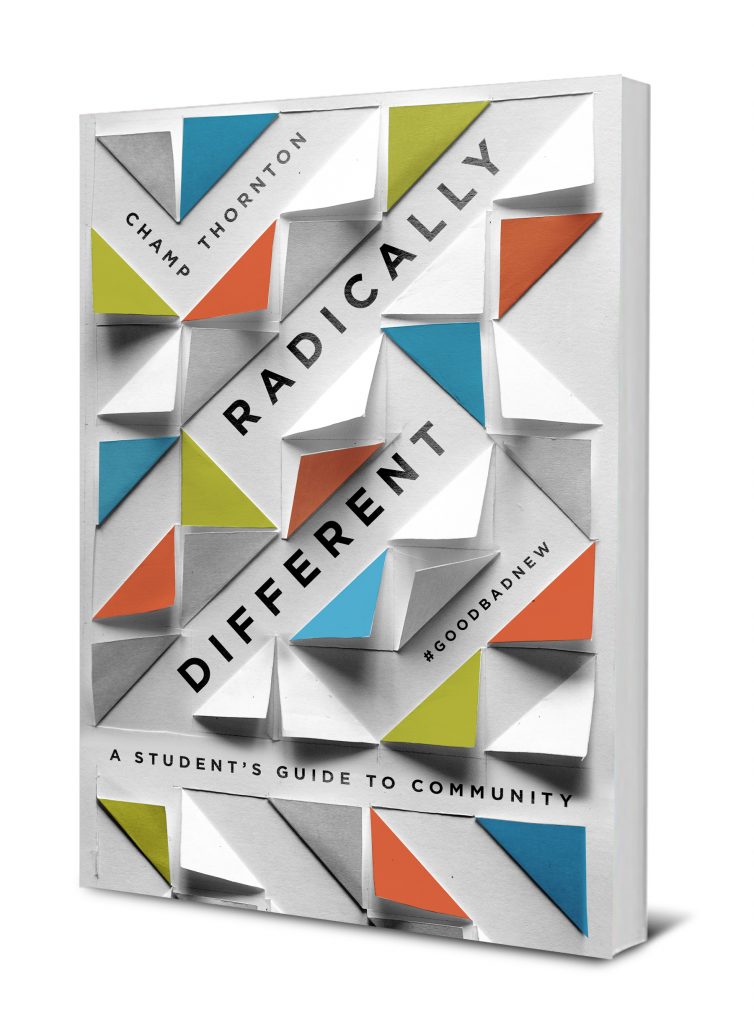As adults it’s hard to figure out how to live as Christians in a morally murky and increasingly hostile world, so how do we teach the next generation to develop relationships in the world in which we live? There are so many areas of life to navigate when growing up. In his book, Radically Different: A Student’s Guide to Community, best-selling author Champ Thornton provides an insightful guide for middle schoolers and young teens who want to live radically even though life and relationships are complicated.
Radically Different equips middle schoolers to untangle the twists of life by presenting them with an in-depth study of “good, bad, and new”—creation, fall, and redemption. By understanding these three concepts, students can discover their unique identity in Christ. Living through the lenses of good, bad, and new makes them radically human, radically biblical, and radically different.
In this interview with Champ Thornton, learn more about what it looks like to live radically different.
Q: How do we teach our kids to live Christianly in this morally murky and increasingly hostile world?
There’s a very real fear in the church and in Christian families today that after children leave them home, they will also leave the faith. Often this is where parents and leaders turn to apologetics in order to show the reasonableness of the Christian faith. Yet, while this assessment of the evidence for Christianity is helpful and necessary, there’s another apologetic that’s more foundational: the apologetic of integrity. In other words, for children to follow the ways of the Lord in today’s world, parents and leaders should ask themselves, “Are my life and priorities communicating that Christianity is real, important, and good?” Our lives are passing on a social apologetic, not just in family or Sunday worship, but every day of the week. So, I think this is where teaching our kids to live Christianly begins.
I also think it’s helpful that we don’t overly simplify the complex questions that arise when the claims of Christianity encounter the conflicting claims of our culture. We’re no longer living in a “good guys wear white hats, and bad guys wear black hats” society. Living Christianly requires careful thought. We have to know (1) the issue we’re dealing with, and (2) how the Bible addresses this issue. But what about areas where the Bible seems to be silent? This is where we find help in reading the Bible, not just as a collection of rules, but as the true story of God’s work in this world. From this perspective, the Bible unfolds in three acts or scenes: Creation, Fall, and Redemption.
Creation: God made everything good. This is how things ought to be.
Fall: Because of human sin, the whole universe is broken. This is just how things are.
Redemption: God sent Jesus to restore what sin had ruined. This is a taste of what new creation will be like.
You can summarize all this into three words: good, bad, and new. These words serve as lenses through which Christians can and should view the world and everything in it. Looking at any area of life, including relationships, through these three lenses will bring clarity about how to live Christianly in an increasingly hostile and murky world.
Q: Who was Radically Different written for, and how is it intended to be used? Can you share more about the format?
Radically Different is primarily aimed for middle schoolers (grades six through eight) and young teens to use in their daily time in God’s Word (i.e., devotions, quiet time, etc.). They can use it by themselves, as a personal, thirteen-week study in God’s Word. The book can also be used by a class or in a family, where multiple people are going through the study as a group.
For a group setting, there’s a Teacher Guide, which gives helpful educational resources (activities, discussion questions, illustrations, and other fun elements) to help guide the students in what they’re learning. For example, if used as part of a class at church, students will read and complete the personal sections in the Student Guide for that week, and then that lesson will be discussed, taught, and applied as a class the following weekend.
Since Radically Different focuses on community, the study is divided in half. The first half emphasizes our relationship with God, and the second our relationships with people. Each week features three sections to complete. Since we know most middle schoolers and young teens are not having their Bible time seven days a week, we wanted to keep the expectations reasonable and achievable. Hopefully, this study will not only establish a weekly routine of time with the Lord in his Word but will also shape a practice of looking at life through the lenses of good, bad, and new. For most weeks, Day 1 is all about what is “good” about that particular relationship, Day 2 is all about what’s “broken” about it, and Day 3 wraps up the week by discussing how Jesus has made it “new.”
Q: What does it mean to be radically different?
The phrase used as the title to this study, Radically Different, means true Christians stand out when contrasted to the fictitious values of a culture that denies God, sees no need of salvation and ignores the Savior. We shouldn’t aim to be odd or strange, or to run and hide in isolation from this world, but we will be unique. As the world continues to improve in many ways, but decline in others, Christians will become more and more out of step with the mainstream of the culture.
Even though non-Christians deny God is the Creator of this world, that denial does not and cannot change the fact this world is indeed created by him. Tellingly, the only place where you can read all of societal “fiction” is inside God’s good yet broken world. There is no other world, no other reality.
In other words, the fiction of this age may seem real, but it can’t actually change reality. The reckless pursuit of pleasure, for example, will one day collide with the realities of God’s moral order. So, we want our kids’ lives—and our own—to be lived in touch with reality. This means Christianity doesn’t just claim to be right, we also offer what is good. We present to this world what it means to be most truly human. But in comparison with all the “fiction” around us, which falsely claims to champion human flourishing, this study is a summons for teens to be radically biblical, radically human, and radically different.
Q: Don’t middle schoolers want to be a part of the group? How do you convince them they want to be different?
The challenge to be Radically Different is also a call to live out this uniqueness in the context of community. In other words, this study aims to help young teens follow Jesus and live Christianly alongside others. But when it comes to the question of how to convince teens to “want to be different,” the key issue relates to the word “want.”
Changing behavior—and that includes someone starting to live “differently”—will require some knowledge. If it didn’t then a study would be pointless. To become like Jesus, we need to know about Jesus. To live biblically, we must know the Bible. But change moves forward on the wheels of desire. More than anything else, your affections will shape your choices. As I say in the Student Guide, “This book isn’t actually about what you think, but about what you love. And we’re to love God most of all (Mark 12:30).” So, the challenge of helping teens be radically different will only come as they see the beauty of God’s grace and his design for this world. When they come to love God, they will be drawn to love people also.
Q: Walk us through the three lenses we need to view the world through.
Life is complicated, and teenagers, even middle schoolers, have to figure it all out while they’re also growing up. There are so many areas of life to navigate—sports, tech, gaming, but especially relationships. However, God’s Word helps us untangle the twists of life. The Bible gives us lenses through which to gain clarity on life issues. Everything on planet earth, including every relationship, is good because God made it. Everything’s also broken because of the Fall, and Christ came to make all things new. Because of creation, fall, and redemption, we can look at everything through the lenses of good, bad, and new. This perspective gives clarity and sets Christians apart as unique. Living and relating in the reality of good, bad, and new makes us radically different.
Q: What are the three questions you encourage readers to ask when they’re trying to figure out a situation in life?
- What is good about this situation/issue/person/thing because God made it?
- What is broken about it because we live on a fallen planet due to sin?
- How does Jesus’s life, death, and resurrection affect or transform how I should think and act toward it?
Q: What are some of the relationships you talk about in the book?
As I mentioned earlier, Radically Different is divided into two halves: Relating to God and Relating to People. After a few initial weeks which examine the three lenses of good, bad and new, the focus of Radically Different shifts to the question of how we relate to God. This section on relating to God includes the following chapters: Listening to God, Talking to God, and Worshiping God.
The second half of the book is about Relating to People, and includes the weekly lessons on relating to parents, relating to friends, relating to family, as well as difficult relationships, broken relationships, and church relationships.
Q: It’s easy to understand earthly relationships, but it can be difficult to grasp how we build a relationship with God. Is that why the first seven lessons focus on relating to God?
The first half of the book focuses on relating to God because our relationship with God is the source of how we relate to others. Our relationship with the Lord may be more difficult to grasp because we can’t see him or actually sit down and have a face-to-face conversation like we would with another person in the room, but it is foundational. If we love God, we will love others, Jesus said. If we personally know the forgiveness of God, we will show that same forgiveness and love to others. If we know Jesus humbled himself for us, then that will shape us to live in humility with others as well. We will only relate to people biblically to the extent that we’re relating well to God biblically.
Q: What is the difference between a difficult and a broken relationship? Do we have to work on those relationships or can we try to eliminate those from our lives?
In this study, the week on difficult relationships is what my kids would call “Dealing with Annoying People.” Since “annoying” may not be the best way to label people, we thought “difficult” would be more appropriate. This week stands in contrast to the one on broken relationships which focuses on handling relational conflict. The Bible teaches we should, where possible, live at peace with all people. This chapter walks young teens through some basic Bible teaching on personal conflict and restoration.
Q: Why was it important to have a chapter on relationships within the church?
Most teens who will use this study will likely be followers of Jesus Christ, and most Christians are also part of a church. That’s the ideal we see in Scripture. As it’s been said, while Christianity is a personal matter, it’s never private. Believers are part of a larger group of believers, the family of God, the Body of Christ, the church. So, since most teens who would use this study would also be part of a church with other believers, we wanted to include a chapter to discuss some of the relational challenges and opportunities which are found within the church.
Q: What is the most important lesson about relationships you hope students learn?
Most fundamentally, I hope that students grow in their conviction to obey the two greatest commands given by Jesus Christ. Our Lord said the two greatest commandments, the directions which sum up all the rest of the Bible’s commands, are: Love God and love people. If teens learn the importance of relying on God to pursue loving him and other people, then this study will have been a success.
But secondarily, I hope teens will also gain the lifelong practice of looking at all of life through the three lenses of good, bad, and new. This three-part grid can be used to examine all kinds of relationships, as well as so much more. You can use good/bad/new to evaluate your connection to work, food, sports, technology, recreation, entertainment, money, etc. If it’s part of the created order, good/bad/new has something to say to us about that particular thing. If teens learn to adopt the good/bad/new telescope as a portable lens on the world, they’ll never view life the same way.
Q: This study comes with a companion Teacher Guide. Do you have to use one to use the other?
If you work with young teens, the Teacher Guide will be a help to you as you walk through this thirteen-week study with your young person. If young teens want to use the study on their own, no Teacher Guide is required; however, moms or dads may still find it useful to have one on hand to facilitate and encourage discussion with their teen.
RADICALLY DIFFERENT: A STUDENT’S GUIDE TO COMMUNITY
Radically Different by best-selling author Champ Thornton is an insightful guide for middle and high school students who want to live radically even though life and relationships are complicated. By examining life through the biblical lenses of Creation, Fall, and Redemption, readers can explore how God’s Word untangles the twists of life.






